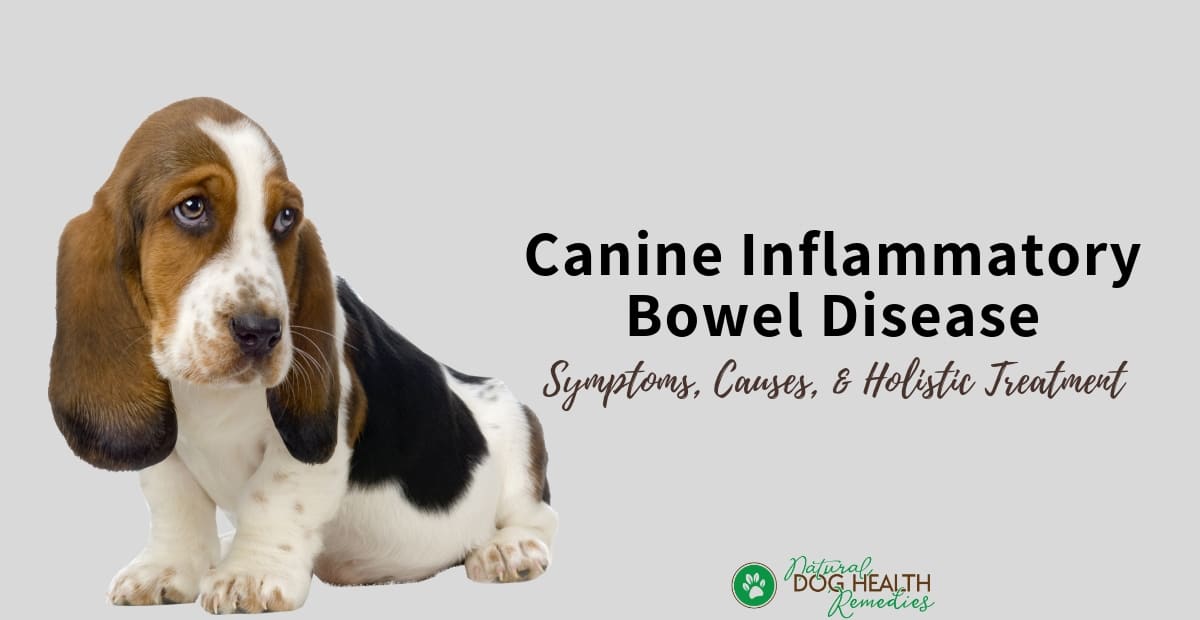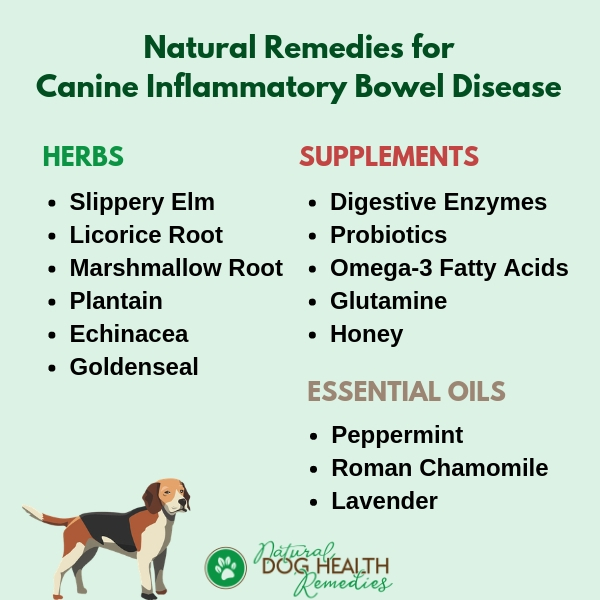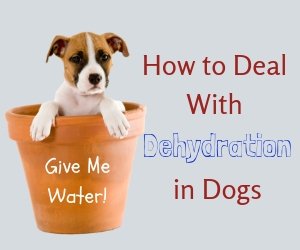Canine Inflammatory Bowel Disease
(FTC Disclosure: If you make a purchase via a link on this page, I may receive a small commission, at no added cost to you.)

Overview
Canine inflammatory bowel disease (IBD) is a rather common autoimmune disease that actually is an umbrella term for a group of conditions (e.g. ulcerative colitis, Crohn's disease), and is one of the most common causes of gastrointestinal problems in dogs.
IBD is the result of the infiltration of inflammatory cells into the mucous lining of the intestines.
What Causes IBD in Dogs?
The cause of IBD in dogs is unclear.
For some dogs, it may be because of their diet - some unidentified dietary protein may cause an immune response in the gastrointestinal tract.
Other factors, such as genetics, chronic stress or anxiety, overuse of antibiotics, bacterial or fungal infections, food sensitivties or intolerance, and abnormalities of the immune system, may be responsible. Most commonly in dogs, IBD is "idiopathic" (cause unknown).
Older dogs (those 8 years of age or older) are more susceptible to canine IBD, although younger dogs can develop this problem as well.
What Happens When a Dog has IBD?
As mentioned above, IBD is an autoimmune disease. The immune response causes the dog's immune system to literally invade and attack its own digestive organs.
Specifically, certain inflammatory cells (e.g. Lymphocytes and Plasmacytes) and various chemicals accumulate, infiltrate, and damage the stomach, small intestine, and/or large intestine.
The results?
Chronic diarrhea and/or vomiting.
Irritably Confusing
Note that inflammatory bowel disease is NOT the same as irritable bowel syndrome (although the two are often incorrectly referred to as one and the same). Irritable bowel syndrome is extremely rare in pets but very common in humans.
Symptoms of IBD in Dogs
Symptoms of this condition depend on the location of the GI system that is responding to the immune attacks. When the stomach and small intestines are involved, vomiting is more common.
When the colon is involved, the dog will have painful bowel movements and diarrhea. The stools sometimes contain blood and may or may not contain mucus.
In severe cases, some dogs with IBD may also suffer from:
- fever;
- lethargy and depression;
- bloating;
- appetite loss; and/or
- chronic weight loss.
Diagnosis and Treatment of IBD in Dogs
Diagnosis
In addition to a complete physical examination, your vet will also have blood and fecal tests done on your dog to rule out other possible causes that can result in similar symptoms (e.g. giardia, poisoning, bacterial infections, worms).
If other possible causes are ruled out, your vet may suggest an endoscopic biopsy to determine if your dog indeed has IBD.
In this procedure, a sedative or light anesthetic is given to the dog. An endoscope is then inserted into the pet's gastrointestinal tract and tiny pieces of tissue are removed for a microscopic examination.
Conventional Treatment
Canine inflammatory bowel disease is usually treated with medications (e.g. corticosteroids such as prednisone; antibiotics such as Metronidazole; immunosuppressive agents such as Azathioprine).
Antidiarrheal drugs and/or antispasmodic drugs are also sometimes used to suppress diarrhea and/or vomiting.
Diet for Dogs with IBD
Dietary change is a very important part of the treatment.
A suitable diet for dogs with IBD should be:
- Hypoallergenic: The ingredients should be tolerated by the individual dog to prevent inflammation in the dog's GI tract. To find out which ingredients are tolerated by YOUR dog, you need to do an elimination diet.
- Gluten-Free: Foods that contain gluten (such as corn, wheat) cause inflammatory response in the GI tract and should be avoided.
- Low Fat: Dogs with IBD cannot digest and absorb fat efficiently. Poorly digested and absorbed fat can make diarrhea worse.
- Easily Digestible: To lessen the burden on the digestive system, dogs with IBD should be fed foods that are highly digestible. A diet made up of high-quality animal protein sources is more readily digestible by dogs than a diet made up of plant-based protein such as soy and wheat.
In addition, small amounts of soluble fiber should be included in the diet to help treat and/or prevent diarrhea that dogs with IBD frequently have.
Soluble fiber helps absorb water during digestion, and it slows the digestive process.
In addition, soluble fiber acts as prebiotics, which are foods for the good bacteria in the dog's gut. In other words, soluble fiber can help stimulate the growth and activity of the good gut bacteria, which are essential for gut health.
Some great soluble fiber sources and are safe for dogs include:
- Apples
- Carrots
- Green beans
- Peas
- Pumpkin
- Sweet potatoes
Natural Remedies for Canine IBD
If diagnosed at its early stage, canine inflammatory bowel disease can be treated by using natural remedies such as supplements and herbs. Even in severe cases, natural remedies can still be used in conjunction with conventional medications.
The natural remedies can speed up recovery, enabling lower dosage of harsh medications to be used, thus limiting the seriousness of side-effects.
Supplements
The following natural supplements are effective in supporting digestion and moderating immune system activities:
- Digestive Enzymes: Inflammatory bowel disease results in improper food digestion and nutrient absorption. Digestive enzymes are essential for dogs with IBD and should be added to the dog's diet to help the digestive system work more properly.
- Probiotics: The normal acid balance in the GI tracts of dogs with inflammatory bowel disease is upset. Very often, the "friendly" bacteria are not present due to intestinal cell damage and overgrowth of harmful bacteria. Use of conventional medication such as antibiotics to treat IBD also kills off the "good guys" in the dog's digestive system.
Adding probiotics to the dog's diet can help replenish the friendly bacteria and help the GI tract to heal.
- Omega-3 Fatty Acids: Omega-3 FAs have anti-inflammatory properties. A good source of Omega-3 FAs is salmon oil.
- Glutamine: IBD causes intestinal cell damage resulting in scarring. Glutamine, which is an amino acid, can help rebuild the intestinal lining so that it functions better.
Recommended dosages for pets are 250 to 3000 mg daily, depending on the size and condition of the pet.
- Honey: Honey has powerful antibacterial properties and is beneficial for dogs with gastrointestinal problems such as IBD.
Herbal Remedies
Herbs can be used to reduce inflammation and alleviate the symptoms of inflammatory bowel disease such as vomiting and diarrhea.
Anti-inflammatory and demulcent herbs (herbs that soothe the mucous membranes) are especially effective. For example:
- Licorice
- Slippery elm
- Plantain
- Marshmallow
Herbs that can strengthen the immune system are also helpful, such as:
- Echinacea
- Goldenseal
Aromatherapy
Dogs suffering from IBD often have painful intestinal cramps and spasms. Essential oils that have antispasmodic properties such as chamomile and peppermint can be used in a diffuser. Let the dog breathe in the scent for 30 minutes or so, a few times a day, to relieve his discomfort caused by spasms.
You can also dilute 2 drops of Peppermint oil, 2 drops of Lavender oil, and 1 drop of Roman Chamomile oil in 30 ml of a carrier oil (e.g. Sweet Almond or Jojoba oil). Use the oil blend to massage gently your dog's tummy, 2-3 times a day.
Natural Products for Canine IBD
This natural herbal formula contains herbs such as Oregon grape, mullein, marshmallow, ginger and are effective in supporting the digestive and immune systems of your dog. As a result, your dog will have a strong and healthy GI tract and solid bowel movements.
This formula contains a combination of N-acetyl glucosamine (a natural compound found in the glycoprotein layer of the mucus membrane), digestive enzymes, probiotics and the herb alfalfa. It is excellent for dogs (and cats) suffering from chronic or recurrent GI problems, such as poor digestion, stomach ulcers, food allergies, or IBD.
 References
References
Eldredge, et al. Dog Owner's Home Veterinary Handbook 4th edition (Wiley Publishing, 2007).
M. Goldstein, The Nature of Animal Healing (Ballantine Books, 2000).
R.H. Pitcairn, The Complete Guide to Natural Health for Dogs and Cats (Rodale, 2005).
W.J. Dodds, D.R. Laverdue, Canine Nutrigenomics - The New Science of Feeding Your Dog for Optimum Health (Dogwise Publishing, 2015).





